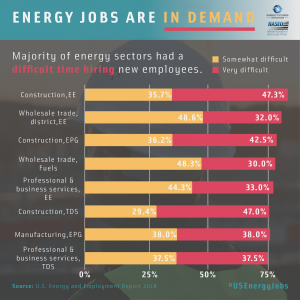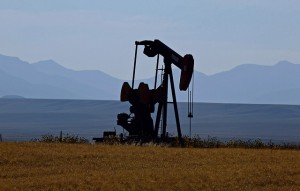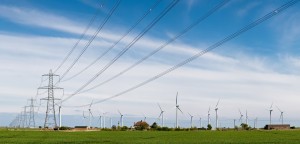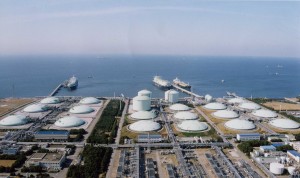18 item(s) were returned.
Distinguished Associate
Energy Futures Initiative
On May 16th, The Energy Futures Initiative (EFI) and the National Association of State Energy Officials (NASEO) released the 2018 U.S. Energy and Employment Report (USEER). The USEER offers data on employment trends in four key energy sectors – Electric Power Generation and Fuels; Transmission, Distribution and Storage; Energy Efficiency and; Motor Vehicles. This is the third installment of the energy jobs survey established by the U.S. Department of Energy in 2016. Overall, firms covered by the survey anticipate roughly 6.2 percent employment growth for 2018. Energy Efficiency employers project the highest growth rate over 2018 (9 percent), followed by… [more]
View InsightAssistant Director
University of Texas Energy Institute
The world has experienced profound changes recently regarding energy and the economy. Fossil fuels, while still abundant, are becoming more costly to develop as the most easily-accessible resources become depleted. Many renewable energy technologies are becoming less costly due in part to market forces as well as supportive state and federal energy policies. These technologies however would require massive capital investment to replace fossil fuels at current scale. Global demand for energy continues to climb while advanced economies are becoming less energy-intensive when measured per unit of GDP. Meanwhile, a global financial crisis as well as mounting public and private… [more]
View InsightOil prices have declined sharply over the last six months, with the U.S. benchmark closing below $50/barrel on Jan. 6th, for the first time since 2009. A number of factors have contributed to this fall in prices, including an increase in U.S. tight oil production and decreased global demand. Beyond the immediate financial benefits of lower fuel prices for U.S. consumers, the falling price of oil raises several policy questions. Impacts on financial markets and geopolitical tensions that could be exacerbated if the low price persists are only a few of the potential issues U.S. policymakers may find themselves dealing… [more]
View InsightAssistant Professor, Energy and Resources Group
University of California, Berkeley
Wind and solar capacity have grown significantly in the last decade, and many believe that significant reductions in carbon emissions require continued expansion of their capacity (see for example recent papers by Jim Williams et al and Jimmy Nelson et al[1]). With the declining cost of wind and solar, the economic case for increasing production from sources whose fuel is free is getting better. But getting these energy sources on to the grid is not without its engineering and economic challenges. Wind and solar production is both variable and uncertain, and grid system operators need to make sure they have… [more]
View InsightVisiting Fellow
Hudson Institute
A number of scholars, from the left and the right have floated versions of a carbon tax. Henry Paulson has also weighed in, favoring a tax. In theory, a uniform comprehensive carbon tax enforced among all major global emitters might have great advantages. Such a tax, if linked to a stringent accounting system, could be more transparent than any other approach to greenhouse gas control. In contrast to command-and-control schemes, a tax would target abatement resources to where they would be most cost-effective. A tax, unlike the 2009 cap-and-trade bill, would make it harder for proponents to falsely promise both… [more]
View InsightChairman of the Energy and Commerce Subcommittee on Energy
U.S. House of Representatives
The House Energy and Commerce Committee recently released a policy paper entitled “Prosperity at Home and Strengthened Allies Abroad – A Global Perspective on Natural Gas Exports.” Over the past year, our committee has analyzed the effects of exporting U.S. liquefied natural gas (LNG) through a series of hearings and an international forum. This report is the culmination of our efforts, detailing the economic and geopolitical benefits of U.S. LNG exports and outlining the actions necessary to realize them. Through our analysis, we found that LNG exports offer the opportunity for the U.S. to improve the domestic economy while providing… [more]
View InsightSenior Tax Counsel
United States Senate Committee on Finance
As part of his efforts to comprehensively reform the tax code, Senate Finance Committee Chairman Max Baucus (D-MT) released a staff discussion draft on December 18, 2013 that proposed a dramatically simpler set of energy tax incentives that are technology-neutral, more predictable, and promote cleaner energy that is made in the United States. Policymakers have included tax breaks for energy in the tax code for nearly one hundred years. These incentives were created with good intentions to create jobs, promote energy security, and help reduce air pollution and environmental damage. But over the years, the number of provisions has ballooned… [more]
View InsightEnergy Secretary Ernest Moniz recently acknowledged that it may be time to lift the ban on exporting crude oil, a comment that elicited a flurry of support and opposition toward the idea and highlighted the need for a thorough debate on the issue. The ban was enacted in 1975, along with the Strategic Petroleum Reserve, as an energy supply security measure in response to the Arab oil embargoes. Since that time, the US energy landscape has changed and many are calling for a review of potentially outdated policies. “Those restrictions on exports were borne, as was the Department of Energy… [more]
View InsightSenior Policy Analyst
Information Technology and Innovation Foundation
Most clean energy advocates believe that the world has all the low-carbon technologies needed to effectively address climate change. In their view – what we describe as the Clean Energy Deployment Consensus – the world doesn’t need technology breakthroughs, but political breakthroughs to drive widespread deployment of clean energy technologies. This translates to a policy environment heavily weighted towards deployment subsidies, mandates, and carbon prices. But The Information Technology & Innovation Foundation (ITIF) argues in its new report, “Challenging the Clean Energy Deployment Consensus,” that the world needs a more comprehensive Innovation Consensus that focuses on developing and deploying affordable… [more]
View InsightA recent hearing of the Energy and Power Subcommittee discussed the regulatory, market and legal barriers to exporting Coal and LNG. Critical issues were the length of time associated with the permitting process as well as the economic and climate impacts associated with the exports. Christopher Smith, Principal Deputy Assistant Secretary and Acting Assistant Secretary for Fossil Energy at the DOE, testified that most of the foundation has been built and that future approvals should be expedited. Jeff Wright, Director, Office of Energy Projects at FERC, stated that many of the delays experienced were the result of filers submitting incomplete… [more]
View Insight








